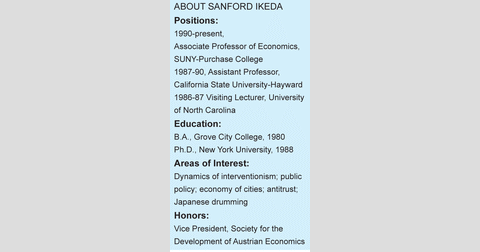An Interview With Sanford Ikeda
The Unintended Consequences of 'Smart Growth'
Property Rights Network: We call it smart growth, other folks call it urban planning, but as a concept, can you describe what it is?
Ikeda: Urban planning is the idea that you need some sort of central authority to guide the development of cities, economic investment and private development.
Smart growth is an approach to urban planning. It is a loosely based school of thought or planning philosophy that values high density, pedestrian walkability, de-emphasis of the automobile, close knit communities and extensive green belts that are placed around urban areas in order to discourage urban sprawl and to encourage increased population density.
PRN: There has been an interesting pattern that has emerged in the history of the United States. There was a time when population was pretty dense in cities. Then people started to move away. Now there seems to be a desire for dense cities again. Can you explain this cycle?
Ikeda: The cycle is caused by what I often call the dynamics of interventionism. It is a characteristic of most public policies. One intervention, to fix one problem, often generates unintended consequences — negative unintended consequences — that often frustrate the plans and intentions of the original planners or the original interveners.
In the earlier portion of the 20th century, social critics looked at cities as crime-ridden, dirty, disease-filled places, emphasizing the negative aspects. They decided to try and figure out a way to make lives better for individuals. Many of them took the radical view that you had to completely redesign cities in order to get rid of all the clutter, and get people to enjoy the countryside - have fresh air and sunshine.
By the 1950s and 1960s, people began to move from the central city to the suburbs. This movement was the result of a deliberate policy to get people out of the cities. After World War II, this sort of accelerated because of the investment of the federal government in interstate highways, and federal investment through the states and localities of infrastructure.
Fast forward a few decades in the 60s and 70s. Groups of social critics began to be concerned with the populating of suburbs and the low density that resulted. Cities began to lose culture and critics began to worry about the pollution being created by the commute from the suburbs to the cities.
PRN: How do you feel about advocates of smart growth and urban planning?
Ikeda: I like to attribute good intentions to the people who are promoting these various policies. I actually agree with many of their principles. I do think that in fact, density is important. I think that walkability is important. I think mixed uses are important. Rather than imposing it by force, however, there is historical evidence of these desired attributes emerging naturally within cities.
See more of this interview at www.mackinac.org/11364.
Michigan Capitol Confidential is the news source produced by the Mackinac Center for Public Policy. Michigan Capitol Confidential reports with a free-market news perspective.

